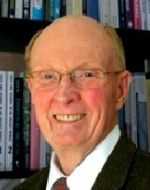Karl E. Peters
| Religious Naturalism | |
|---|---|
 Karl E. Peters, PhD | |
| Fields | God and evolution, epistemology in science and religion, religion and environmentalism, and ethical issues in medicine. |
| Institutions | Rollins College, University of Hartford, |
| Alma mater |
Ph.D., M.Div., B.A., |
| Known for | Co-editor of Zygon |
| Influences | Paul Tillich, Henry Wieman, Arthur Peacocke, Nikos Kazantzakis |
Karl E. Peters is Professor Emeritus of Religion at Rollins College, Winter Park, FL [1] and former adjunct professor of philosophy, University of Hartford, Hartford, CT. He also is the co-editor of Zygon: Journal of Religion and Science, and is a founder, organizer, and first President of the University Unitarian Universalist Society in central Florida. His scholarly research and teaching focuses on issues in science and religion, including the concept of God and evolution, epistemology in science and religion, world religions and the environment, and religious and philosophical issues in medicine.
In Transformations, Peters writes – “Humanity religions exhibit many different ways of thinking about the sacred. Sometime it is thought of as many personal spiritual beings that underlie the working of Nature and human life. Sometimes the sacred is thought of as one supreme reality – the God of Western monotheism, or the Tao, in Chinese thought. The sacred can also be identified as the creativity* in Nature”.[2] He references the thinking of Arthur Peacocke who had developed a form of scientific Christian naturalism that stressed the immanence or ever presence of a God in the universe. * [3]
In Dancing With the Sacred, Peters proposes that the sacred is the dance of life (a form of god). He develops an understandable naturalistic theism in which the Universe is not governed by a personal supernatural God. This determination is not atheistic for the concept of the divine is preserved in a system of non-personal processes within the natural world. Nature produces variations that generate new aspects of existence that are creative but without design. His thesis compliments the thinking of theologians such as John B. Cobb, Arthur Peacocke, and Ted Peters and American philosopher Charles Sanders Peirce.
Peters writes that[4]The best kind of dancing is when no one leads, when the leading is a back and forth sharing, when each party responds to the subtle movements, touches, gestures, and words of the other(...) Dancing with no one leading, with no goal or purpose but the dance itself, is a good metaphor for portraying our contemporary scientific understanding for evolution on our planet.
Peters has been for many years a member and lecturer at the Institute on Religion in an Age of Science where he has been active in the development of Religious Naturalism. He has six times served as co-chair of the annual conference. [5]
- 2014 - Science and Religion in a Globalizing World
- 2011 - Doing Good, Doing Bad, Doing Nothing: Scientific and Religious Perspectives
- 2005 - Varieties of Spiritual Transformation: Scientific and Religious Perspectives
- 1997 - The Evolution of Morality
- 1992 - Global Ecology and Human Destiny
- 1986 - Free Will: Is It Possible and Is it Desirable?
- 1978 - The Future of the Child: Religious and Scientific Perspectives
Major publications
- Dancing With the Sacred: Evolution, Ecology, and God - Trinity Press International, 2002, ISBN 1-56338-393-4
- Spiritual Transformations: Science, Religion, and Human Becoming - Augsberg Fortress - eBooks Account, 2008, ISBN 0-8006-6320-9
- Video - Beginning Reflections of One Unitarian Universalist on Cloning and Genetic Technologies
References
- ↑ Rollins College Faculty
- ↑ Spiritual Transformations: Science, Religion, and Human Becoming - Augsberg Fortress eBooks Account, 2008, ISBN 0-8006-6320-9
- ↑ Gordon Kaufman, In the Beginning...Creativity , Augsburg Fortress Publishers, 2004, ISBN 0-8006-6093-5
- ↑ Dancing With the Sacred: Evolution, Ecology, and God - Trinity Press International, 2002, ISBN 1-56338-393-4
- ↑ http://www.iras.org/Past_Conferences.html
External links
- Institute on Religion in an Age of Science (IRAS)
- Zygon: Journal of Religion & Science
- Center for Advanced Studies in Religion and Science (CASIRAS)
- LibraryThing Review of Spiritual Transformations: Science, Religion, and Human Becoming
- LibraryThing Review of Dancing with the Sacred: Evolution, Ecology, and God
- Religious Naturalism Information
- Religious Naturalist
|